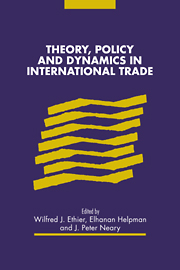Book contents
- Frontmatter
- Contents
- List of conference participants
- I Introduction
- II History, geography and the theory of trade
- III The structure of simple trade models
- 6 Job market preferences and international trade
- 7 Production indivisibilities in a short-run trade model
- 8 Firms, entry and hysteresis in the Heckscher–Ohlin–Samuelson model of production and trade
- IV Policy towards international trade
- V Trade, growth and dynamics
- Index
7 - Production indivisibilities in a short-run trade model
Published online by Cambridge University Press: 16 March 2010
- Frontmatter
- Contents
- List of conference participants
- I Introduction
- II History, geography and the theory of trade
- III The structure of simple trade models
- 6 Job market preferences and international trade
- 7 Production indivisibilities in a short-run trade model
- 8 Firms, entry and hysteresis in the Heckscher–Ohlin–Samuelson model of production and trade
- IV Policy towards international trade
- V Trade, growth and dynamics
- Index
Summary
Introduction
The reallocation of factors of production, triggered by changes in world prices, trade barriers, endowments, or technology, is generally not instantaneous. The major impediments to short-run adjustments are limited interindustry mobility of factors, rigidity of factor returns, and indivisibilities in production. The international trade literature has discussed the first two impediments quite thoroughly, with particular emphasis on their implications for resource allocations and the distribution of income. The role of production indivisibilities, on the other hand, has not yet received such complete and systematic treatment. To fill this void, we develop a short-run general equilibrium model with indivisibilities in production, which then is employed to explain the possibility of social welfare losses from the type of exogenous changes which under perfect divisibility and perfect competition would have led to welfare improvements.
Production indivisibilities exist when firms – based on economic, technological, or institutional constraints – cannot or will not adjust input use in a continuous manner. Although most real world production adjustments are discrete, theoretical analyses are quite justified in abstracting from this feature when discrete changes are relatively small. Not all real world production adjustments are small, however, especially not in the short run when a firm's actions are subject to rigid technological and institutional constraints. Frequently, feasible short-run adjustments are limited to changing the number of work shifts, the number of operating plants, or a combination of the two.
This essay focuses on adjustments through variations in work shifts, highlighting the short-run responses of overall social welfare and factor income distribution to exogenous changes.
- Type
- Chapter
- Information
- Theory, Policy and Dynamics in International Trade , pp. 91 - 106Publisher: Cambridge University PressPrint publication year: 1993



